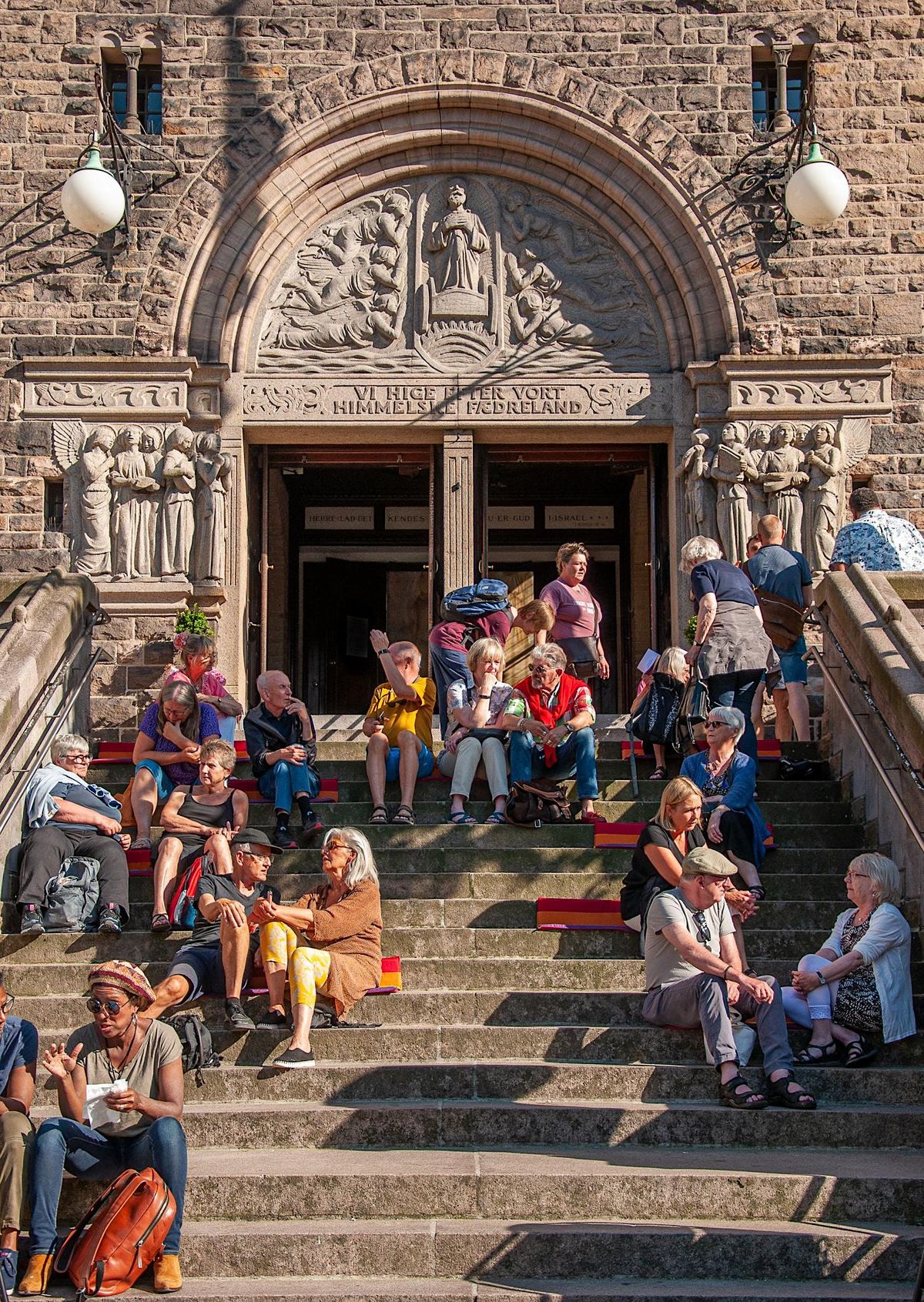EARLY MONDAY med Giulia Cantone: "The German Baroque Lute"
Schedule
Mon Oct 06 2025 at 08:00 pm to 09:00 pm
UTC+02:00Location
KoncertKirken | Copenhagen , SK

Advertisement
Giulia Cantone (IT/DK) - lutThe German Baroque Lute
Musik af Sylvius Leopold Weiss, Johann Sebastian Bach, David Kellner, Bernhard Joachim Hagen, Adam Falckenhagen
This program explores the German Baroque lute repertoire from the 17th to the 18th century through some of the most representative composers of this period. At the dawn of the 18th century, the center of lute music shifts from France to Germany and Bohemia, where the instrument enjoys a remarkable flourishing. The main areas are Berlin, Dresden, Leipzig, Bayreuth/Nuremberg/Munich, and Vienna. Dresden, in particular, became a major center thanks to Sylvius Leopold Weiss (1686–1750), whose virtuosity and compositional mastery were celebrated by his contemporaries.
Between the early 1700s and about 1780, German lute repertoire blends French, Italian, and German stylistic elements—a fusion most evident in Weiss’s works. In this period, the galant aesthetic, represented by composers such as Bernhard Joachim Hagen, gains ground, and in Vienna, contemporaries like Kohaut usher in a pre-Classical sensibility. This period marks both the height and gradual decline of the lute in Western music, culminating in its near disappearance by the 19th century.
But how did this instrument evolve? In the first half of the 17th century, France was the laboratory for new lute tunings. The so-called Accords Nouveaux (new chords) replaced the Renaissance Vieil Ton (old tuning), giving rise to the Baroque lute’s distinctive D minor tuning, established around 1640. The 11-course baroque lute became then the standard in France and Germany for decades.
Later on, Weiss might have been the one to push the instrument’s boundaries by commissioning, around 1718, the first 13-course lute from Prague’s lute maker Thomas Edlinger, thereby expanding the lute’s expressive and technical range.
Opening the program is Ernst Gottlieb Baron, a contemporary of Weiss employed at the Berlin court, who made significant contributions to the lute as a teacher and theorist, as well as a composer. His 1727 Historisch Theoretisch und Practische Untersuchung des Instrumentes der Lauten remains a fundamental source on the lute’s history and stylistic development.
Among the program’s highlights is Weiss’s enigmatic Sonata L'infidele, whose title may reference the Turkish siege of Vienna, as reported by D.A. Smith, foremost scholar on Weiss: “It is not clear whether the title refers to a faithless lover or to the Muslims. The latter seems plausible for two reasons: 1) The Turks had been driven from the gates of Vienna by a pan-European army led by King John Sobieski of Poland. Weiss spent six years in Rome with the widow and younger son of the king. 2) Movement 5, the Musette, features several sections of pedal points in the contra basses which are reminiscent of cannon fire as of the drones of the musette (a french bagpipe). The victory over the Turks had been Poland’s finest hour, and Dresden was the seat of the Polish court while Weiss was there”.
The program also features Bach’s Fugue BWV 1000, an arrangement of the violin fugue BWV 1001/2, written in tablature by lutenist Johann Christian Weyrauch. Bach’s engagement with lute music testifies to the instrument’s artistic importance at the time.
David Kellner, an organist active mostly in Sweden at the German Church in Stockholm, contributed XVI auserlesene Lauten-Stücke (1747), a collection of fantasias, chaconnes, and dances, and one of the last printed works of lute compositions.
Finally, Bernhard Joachim Hagen, Bayreuth’s lutenist and violinist, embodies the galant style and early Sturm und Drang spirit, as heard in his Variazioni per il liuto del Sigr. Locatelli (italian violin player and composer), marking the transition towards the Classical era.
Through this program, I invite you to discover the German Baroque lute’s unique sound world, its evolution, and the composers who shaped its extraordinary legacy.
- - - - - -
About Giulia Cantone
After completing her Master’s degree in Psychology and Cultural Anthropology at the University of Padua (Italy), Giulia Cantone studied at the Musikhochschule in Trossingen (Germany) with Rolf Lislevand, completing in 2022 a Master’s degree in Lute with top grades. She then attended specialization classes on basso continuo and baroque lute with Evangelina Mascardi, at the Conservatorio “A.Vivaldi” in Alessandria (Italy).
Educated on several early plucked instruments such as renaissance lute, 10 course lute, vihuela, theorbo, baroque guitar and baroque lute, she then focused on the praxis of basso continuo and to the baroque and renaissance lute solo and chamber music repertoire.
She took part in several solo and chamber masterclasses with internationally renowned musicians, such as Paul O’Dette, Hopkinson Smith, Eduardo Egüez, Joachim Held, Paul Beier, amongst others. Her experience in basso continuo was enhanced by projects next to Gabriel Garrido, Andrew Lawrence King.
She performed a solo recital on theorbo and renaissance lute at the “Fringe – Utrecht Early Music Festival” in Holland, that was entirely dedicated to the italian lute music between 16th and 17th century. She played in the final round of the competition “Baden-Württemberg Art Foundation Scholarship for young artists”, as the only musician belonging to the early music field.
She has played in Germany, Denmark, Sweden, Holland, Italy, France, gaining rich experience through collaborations with prestigious institutions such as Royal Danish Academy of Music, Cuvilliés Teather in Munich (G.F.Händel’s “Giulio Cesare”), Trinitatis Church in Copenhagen, Göteborg Baroque, Østerbro Chamber Music Festival, Odense Baroque Festival.
She performed as continuo player in Munich with the Bayerische Staatsorchester in Bach’s “Messe in h-Moll”, conducted by Vladimir Jurowski; at the Bayerische Staatsoper in H.Purcell’s “Dido and Aeneas,” conducted by Andrew Manze and Christopher Moulds.
Billetter i døren fra 19.30: 130 DKK / Stud. 90 DKK
EARLY MONDAY støttes af Statens Kunstfond, Københavns Kommune, William Demant Fonden, Augustinus Fonden.
Advertisement
Where is it happening?
KoncertKirken, Blågårds Plads 6A, 2200 København N, Danmark, Copenhagen , DenmarkEvent Location & Nearby Stays:


![DR Pigekoret i m\u00f8rke | DR Koncerthuset | Koncertsalen [F\u00c5 BILLETTER]](https://cdn-ip.allevents.in/s/rs:fill:500:250/g:sm/sh:100/aHR0cHM6Ly9jZG4tYXouYWxsZXZlbnRzLmluL2V2ZW50czgvYmFubmVycy82ZTBmYzQ2ZDRmZjRlNmVlNDI2NzVmMTMyMzM3ZTA3M2YyMmY4ZTNiYzU0YTMxMGM1OGRkYzdjOTk3OGI3YWExLXJpbWctdzEyMDAtaDYwMC1kYzA1MDUwNS1nbWlyP3Y9MTc1NzY4NzI4NQ.avif)















